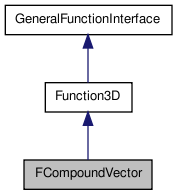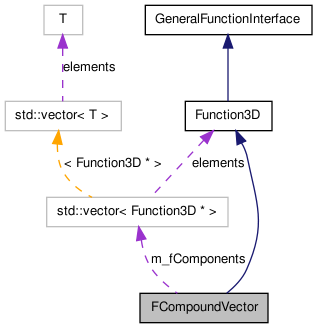#include <fcompoundvector.h>


Public Member Functions | |
| FCompoundVector (Function3D *f1, Function3D *f2, Function3D *f3, bool deleteObjs=false) | |
| FCompoundVector (Function3D *f1, Function3D *f2, bool deleteObjs=false) | |
| FCompoundVector (std::vector< Function3D * > &vF, bool deleteObjs=false) | |
| virtual | ~FCompoundVector () |
| virtual bool | isInDomain (const VecDouble &p, unsigned component=0) const |
| virtual double | operator() (const VecDouble &p, const unsigned int component=0) const |
Private Attributes | |
| std::vector< Function3D * > | m_fComponents |
| bool | m_deleteObjs |
This function defines a vector functions (number os components > 1) such that the values of each component is defined by a specific function passed in the contruction or the class. This class is a very ellegant way to combine multiple scalar function in just one vector function. The functions that compound this class must be scalar, in ohter words, must be number of components equal to 1.
Definition at line 13 of file fcompoundvector.h.
| FCompoundVector::FCompoundVector | ( | Function3D * | f1, | |
| Function3D * | f2, | |||
| Function3D * | f3, | |||
| bool | deleteObjs = false | |||
| ) |
Construct the FCompoundVector of dimension 3 given the three functions (f1,f2,f3) defining the values of the components 0,1,2 respectively deleteObjs Should the class delete the function objects passed as arguments ?
Definition at line 7 of file fcompoundvector.cpp.
00008 :Function3D(3) 00009 { 00010 assert(f1->n_components() == 1); 00011 assert(f2->n_components() == 1); 00012 assert(f3->n_components() == 1); 00013 m_fComponents.resize(3); 00014 m_fComponents[0]=f1; 00015 m_fComponents[1]=f2; 00016 m_fComponents[2]=f3; 00017 m_deleteObjs = deleteObjs; 00018 }
| FCompoundVector::FCompoundVector | ( | Function3D * | f1, | |
| Function3D * | f2, | |||
| bool | deleteObjs = false | |||
| ) |
Definition at line 28 of file fcompoundvector.cpp.
00029 :Function3D(2) 00030 { 00031 assert(f1->n_components() == 1); 00032 assert(f2->n_components() == 1); 00033 m_fComponents.resize(2); 00034 m_fComponents[0]=f1; 00035 m_fComponents[1]=f2; 00036 m_deleteObjs = deleteObjs; 00037 00038 }
| FCompoundVector::FCompoundVector | ( | std::vector< Function3D * > & | vF, | |
| bool | deleteObjs = false | |||
| ) |
Definition at line 21 of file fcompoundvector.cpp.
00021 :Function3D(vF.size()) 00022 { 00023 m_fComponents=vF; 00024 m_deleteObjs = deleteObjs; 00025 }
| FCompoundVector::~FCompoundVector | ( | ) | [virtual] |
Definition at line 56 of file fcompoundvector.cpp.
00057 { 00058 if (m_deleteObjs) 00059 { 00060 for (unsigned i=0;i<m_fComponents.size();i++) 00061 { 00062 delete m_fComponents[i]; 00063 } 00064 } 00065 }
| bool FCompoundVector::isInDomain | ( | const VecDouble & | p, | |
| unsigned | component = 0 | |||
| ) | const [virtual] |
Reimplemented from GeneralFunctionInterface.
Definition at line 41 of file fcompoundvector.cpp.
00042 { 00043 assert(component < m_fComponents.size()); 00044 return m_fComponents[component]->isInDomain(p,0); 00045 00046 }
| double FCompoundVector::operator() | ( | const VecDouble & | p, | |
| const unsigned int | component = 0 | |||
| ) | const [virtual] |
Implements GeneralFunctionInterface.
Definition at line 49 of file fcompoundvector.cpp.
00050 { 00051 assert(component < m_fComponents.size()); 00052 return (*(m_fComponents[component]))(p,0); 00053 }
bool FCompoundVector::m_deleteObjs [private] |
Flag to indiciate if this class shoud destroy the function pointers received in the contructor
Definition at line 17 of file fcompoundvector.h.
std::vector<Function3D*> FCompoundVector::m_fComponents [private] |
vector to store the components` functions
Definition at line 16 of file fcompoundvector.h.
 1.6.3
1.6.3